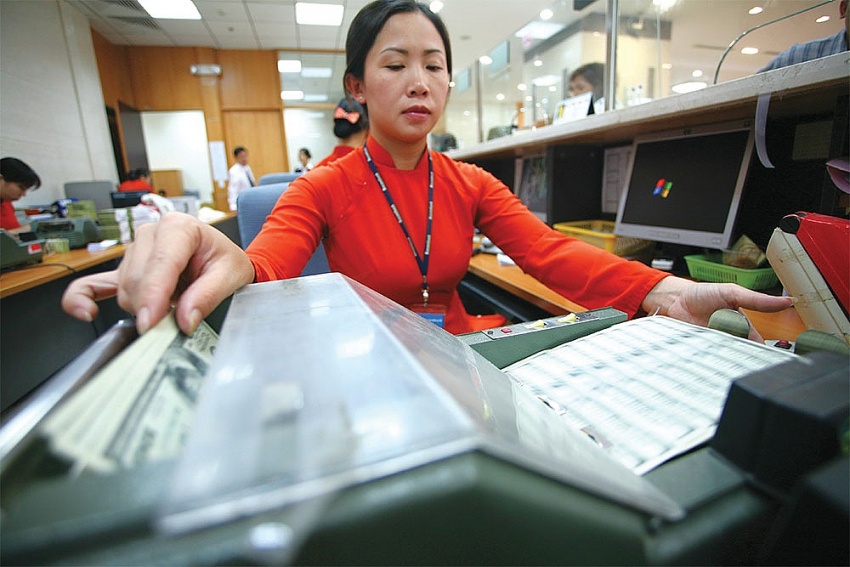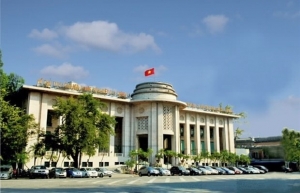State-owned banks leading in forex trading revenues
 |
| State-owned entities have enjoyed substantial and stable revenue streams so far this year, photo Le Toan |
Contrary to initial expectations, the Vietnamese forex market experienced significant fluctuations in August as the strong USD exerted pressure on the VND, pushing the USD/VND exchange rate to 24,073 on September 5.
This represented a 1.6 per cent increase compared to the end of July, and a 1.9 per cent increase since the beginning of the year.
In an interview with VIR, a high-ranking official from BIDV stated that the recent increase had several similarities to the one in July, as the pressure increased both from the international and domestic environments.
In Vietnam, the VND-USD interest rate differential continued to narrow to a historically low level, and overnight to one-week interbank rates fluctuated, triggering demand for forward contracts to hedge market risks during the period of sharp exchange rate increase. The balance of foreign exchange supply and demand in August shifted negatively.
“Although the supply has been supplemented by basic flows such as the trade balance surplus of approximately $3.8 billion and VPBank’s capital raising transactions of about $1.3 billion, the sharp increase in forward foreign exchange demand has put pressure on the exchange rate, especially in mid-August,” the leader said.
Major banks focusing on forex trading consistently generate substantial profits. Economist Nguyen Tri Hieu explained that profits from forex trading come from immediate currency exchange, derivatives trading, and lending activities. For example, in future’s trading, the transaction price depends on the difference in interest rates between the VND and the USD.
“When exchange rates fluctuate significantly in an upward direction, immediate buy-sell transactions by banks are highly profitable and straightforward because they buy at a low price and sell at a high price in a short period. This type of trading is suitable for banks with strong cash flows,” Hieu explained.
The financial reports for the second quarter of 27 listed banks on the stock exchange and Agribank revealed that the total net profit from forex trading in the first six months of 2023 reached nearly $497 million, an 18 per cent increase compared to the same period last year, over seven times the growth rate of total operating income.
As usual, state-owned commercial banks continue to lead in terms of revenue from forex trading. Vietcombank, VietinBank, BIDV, and Agribank recorded a 30 per cent increase in net profit in H1 compared to the same period, accounting for 69 per cent of the total net profit for the entire industry.
“The profit of these major four entities is due to their existing strengths in foreign exchange business with extensive transaction networks both domestically and internationally, combined with the state-owned element in their business activities,” Hieu noted.
Their financial reports indicate that profits from immediate currency exchange activities are recorded separately from profits derived from lending activities. In practice, with the listed selling prices in the first half of the year consistently higher than purchase prices, state-owned banks have enjoyed substantial and stable revenue streams.
In contrary, some large private banks, such as Techcombank and VPBank, incurred losses from forex trading. Financial reports strongly suggested that the forex trading losses of VPBank and Techcombank were related to the currency derivatives segment, while immediate buy-sell transactions remained profitable.
According to one securities company director, financial data showed that many banks incurred losses from forex trading. Still, the actual profits from forex trading were substantial and were accounted for separately in different business operations. All banks used swap transactions to exchange USD for VND and then used VND to lend to businesses.
“Profits from lending activities are always higher than the potential reduction in the USD/VND exchange rate, so, overall, the net profit of banks from forex trading remains significant,” the director emphasised.
The senior leader at BIDV predicted that the USD/VND exchange rate in the interbank market could be quite volatile in September due to several dominant factors, such as international uncertainty regarding the strong USD.
“Although forward foreign exchange demand from customers may continue to increase in the context of the VND-USD interest rate differential remaining deep in the negative territory, the pace of increase may slow down as a significant portion has been somewhat met in the previous month,” he said.
 | Central bank sells greenback to stabilise forex market The State Bank of Vietnam (SBV) has so far this year sold about 12-13 billion USD to stabilise the domestic forex market, according to Viet Dragon Securities Corporation (VDSC). |
 | Trading volumes increase in spite of money market jitters As financial fragility is pushed by uncomfortably high expansion and national banks’ arrangements push investigators to pile back into the market, forex trading volumes are rising again. |
What the stars mean:
★ Poor ★ ★ Promising ★★★ Good ★★★★ Very good ★★★★★ Exceptional
Related Contents
Latest News
More News
- Private capital funds as cornerstone of IFC plans (February 20, 2026 | 14:38)
- Priorities for building credibility and momentum within Vietnamese IFCs (February 20, 2026 | 14:29)
- How Hong Kong can bridge critical financial centre gaps (February 20, 2026 | 14:22)
- All global experiences useful for Vietnam’s international financial hub (February 20, 2026 | 14:16)
- Raised ties reaffirm strategic trust (February 20, 2026 | 14:06)
- Sustained growth can translate into income gains (February 19, 2026 | 18:55)
- The vision to maintain a stable monetary policy (February 19, 2026 | 08:50)
- Banking sector faces data governance hurdles in AI transition (February 19, 2026 | 08:00)
- AI leading to shift in banking roles (February 18, 2026 | 19:54)
- Digital banking enters season of transformation (February 16, 2026 | 09:00)

 Tag:
Tag:


















 Mobile Version
Mobile Version